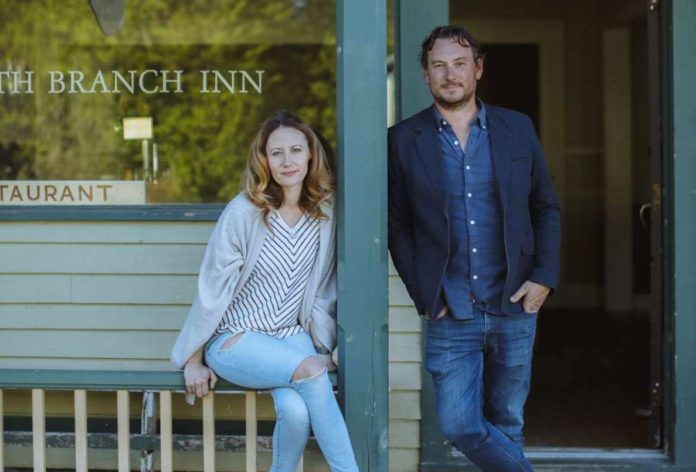Sims Foster remembers hearing stories from his grandparents about the Catskills of their youth. They described bustling main streets and glittering resorts, with vibrant clubs and restaurants, enticing 150,000 visitors each summer. For Foster, it seemed an impossible daydream. Growing up in Livingston Manor of the 1980s and 1990s, Main Street was mostly boarded up and all but one of those grand former leisure palaces were gone.
Thirty years later, the Sullivan County of his grandparents’ era doesn’t seem so far-fetched. The main streets of Callicoon, Livingston Manor, Jeffersonville, and Narrowsburg are again lively, home to independent boutiques, farm-to-table restaurants, and natural wine bars — drawing roughly 7 million visitors in 2019, compared with 4.5 million the year before according to the Sullivan Catskills Visitors Association.
While the tourism industry took a mighty blow during the pandemic, investment hasn’t slowed. The Catskills added roughly 2,000 rooms to its inventory over the past two years, and Sullivan County, which stretches from the base of the Catskill mountain range to the Pennsylvania border, will see a half dozen hotel openings in 2021 alone.
They range in flavor from the boutique Seminary Hill in Callicoon, a cidery and tasting room with a reimagined take on a Victorian “boarding house,” to the opulent The Chatwal Lodge, a 10-suite luxury retreat on The Chapin Estate in Bethel. Citing the “boomlet” of “small, design-y hotels,” Travel + Leisure named the Catskills one of the “50 Best Places to Travel” in 2021.
Sims Foster himself, however, along with Kirsten Harlow Foster, his wife and business partner, have played an integral role in setting this “boomlet” in motion. In the past seven years, their Foster Supply Hospitality group opened six hotels and two restaurants (the couple also launched the food education nonprofit A Single Bite and had two children).
Each property is unique, designed to reflect the history of the building or locale, from Kenoza Hall, a modern take on a Victorian lakeside spa near Bethel, to the most recent, Hotel Darby, outside of Narrowsburg, with its seventies-inspired summer camp chic.
In early 2022, they plan to open a wellness retreat in Neversink, followed by their first venture outside of the region and largest project yet: an 80-room hotel across three landmark buildings in Newburgh, whose construction should be complete by next year. They saw parallels between Newburgh and the Sullivan County they first returned to in 2014.
“It feels very much like a place [where] we can have an impact on the community,” Foster said.
Catskills kid returns, rethinks home
Foster has deep roots in Sullivan County with his family going back four generations. He described an idyllic childhood growing up in Livingston Manor: summers spent fishing and hiking and winters skiing.
“My mother would feed my brother and me breakfast, and then kick us out the backdoor,” he said. Sims’ family was active in the community; his father was a school board president and his mother played the organ in church every Sunday. “My parents instilled a sense of duty to the community even though it was struggling.”
Kirsten, who has a background in economics, is connected to the region, too. Her father grew up in the Bronx, but spent summers working at the Concord, one of the last resorts to close from the Borsht Belt-era (the name collectively given to the swath of regional resorts catering to summering Jewish families). Incidentally, Sims’ father used to take him to the Concord for haircuts and egg creams as a child. The pair met fly fishing in the Catskills and when it came time to raise a family, Kirsten said Sullivan County “felt like home.”
When Sims first left for college, he didn’t initially plan on returning. “We were the land left behind,” he said. After a stint as a jazz musician in New York City, he spent 20 years working in hospitality, opening more than 40 hotels, restaurants and bars, working with brands like The James, Thompson and The Benjamin.
“A huge part of coming home, was I felt I had a skillset that could be beneficial to the community,” he said. “We could come up here and apply it to a place that really mattered deeply to us.”
Sims had previously opened a coffeeshop (Peez Leweez in 2002) and two restaurants (Resort in 2005 and The Lazy Beagle in 2008) in Livingston Manor with his brother, while living in New York City (in Kirsten’s words, “he never really left”), but the couple’s first venture under the Foster Supply banner came in 2014 with The Arnold House, a hip little inn on Shandelee Mountain near town.
Small business owners on Main Street told the Fosters they felt an immediate positive economic impact. “Everyone quickly realized, if we can get more people into town, it helps,” Kirsten said.
Tracing the impact of Sullivan County’s travel boom
Each Foster Supply property reflects the character of the building or locale. Kenoza Hall near Bethel is a modern take on a Victorian lakeside spa. Two more properties are in the works: a wellness retreat in Neversink, followed by their first venture outside of the region, an 80-room hotel across three landmark buildings in Newburgh. “It feels very much like a place [where] we can have an impact on the community,” Sims Foster said.
Lawrence BraunAt the height of its popularity in the first half of the 20th century, the Catskills was home to more than 500 hotels. This era ended with the advent of cheap international air travel, amongst other factors, and the region fell out of favor. The decline of farming also contributed to an economic downturn that lasted into the 21st century.
For vacationers from New York City, this westerly corner of the Catskills is more rural and less accessible than more popular towns of the Hudson Valley, which insulated it from gentrification until recently.
Over the past decade, however, creative entrepreneurs have been enticed by affordable real estate and the possibilities offered by empty storefronts. Coalescing around a can-do attitude and a sense of community sustainability, many have innovated locally, creating a sense of accelerating momentum.
Susan A. Manning, who founded Seminary Hill, along with her husband Doug Doetsch, a fifth-generation Callicoon resident, credited the Foster’s success as one of the factors that encouraged them to invest in a project of this scale. “Sims really showed people you could do something aesthetically very interesting and on the cutting edge of design,” she said, adding, “He was hugely helpful to us when we were just starting out.”
For the Fosters, galvanizing this momentum was part of what drove them to open successive properties so fast. The region had experienced a number of false starts and many locally were jaded about the reality of lasting change. As Sims said, “We were going to put our heads down and just barrel through, hoping it gave others, who might be on the fence, the confidence to pursue their dream as well.”
By many accounts it did. Alessandra Iavarone, founder of lifestyle “shoppe” The Velvet Maple in Narrowsburg and an interior designer, has worked on a number of Foster Supply properties. She said the company’s swift ascension has offered inspiration to everyone from “young people just starting out, wanting to learn a new trade, to more experienced workers simply looking for a change of pace.”
Of course, the new catalogue of high-design outposts and the city transplants so often behind them don’t represent the majority of Sullivan. The county is ranked second most unhealthy in the state of New York, and 16 percent of the population lives in poverty according to U.S. census data. It has suffered devastatingly from opioid-related deaths, and post pandemic an estimated 18.9 percent are behind on rent. These statistics are rarely mentioned in glittering travel features crowning whichever hip little hamlet as the hotspot du jour.
The broader impact of this tourism boom is yet to be cemented. Problems cited repeatedly by locals are the lack of affordable housing and a hospitality staffing crisis. Almost every restaurant and bar has a job posting in the window. Foster Supply employs 120 people alone, and offers career development opportunities, although they also recruit from further afield to maintain staffing levels.
As Manning of Seminary Hill said: “There was a generation that if they wanted a middle-class life they had to leave. There wasn’t much to do.” Now that’s starting to change.
Equally, revenue from tourism generates taxes that can be put toward combating underlying problems. According to Roberta Byron-Lockwood, the President/CEO of the Sullivan Catskills Visitors Association, the average household in Sullivan County would pay an additional $2,238 annually to maintain the same level of government services if it weren’t for tourism-generated state and local taxes.
There seems to be a slow shift in how people view the region in which they live, which could prove a catalyst for change itself. “When growing up here there was a heavy negative narrative, and I didn’t realize until recently the dangers of that,” Sims said, a sentiment echoed by many others.
“We’ve still got problems, yes, but now people are also talking about what a great place it is. I’ll take that all day long.”
More Hudson Valley travel
Credit: Source link





























